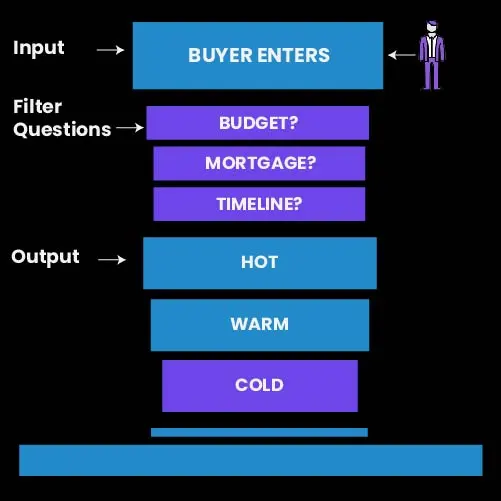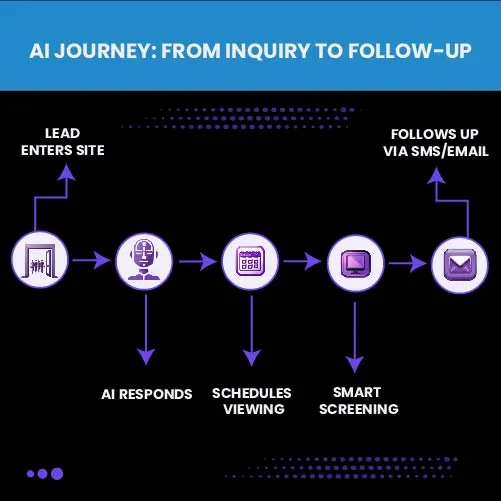Artificial intelligence (AI), despite its silent partner status, is an excellent addition to the world of real estate, where timing is everything, and communication and client experience are the keys that can lead to either success or failure. The real estate business market is dynamic, referrals are made promptly, clients want immediate feedback, and follow-up cannot be delayed. That is where AI comes in to eliminate the number of middleman operations through automating tasks such as scheduling viewings, vetting clients, and appointment reminders without the input of a human being.
It is time to see how AI Voice agent is transforming the real estate business and how progressive agents have incorporated this technology to ensure they are ahead of the pack.
1. Booking Viewings 24/7, No Need to Lift a Finger
Most people were used to the tediousness of scheduling property viewings by repeating the process of contacting agents and clients several times. It took a lot of time and it was subject to scheduling mishaps and also limited in working hours. That issue is a thing of the past with AI voice agents and intelligent booking systems.
The process of arranging appointments to view property may now be fully run by the AI. A chatbot on your site or the voice assistant answering late-night calls will allow your clients to book, reschedule or cancel their appointments independently—immediately. The save-time feature is that AI can be combined with your calendar, and only free time is proposed, which prevents the issue of double-booked appointments and ceremonies.
Additionally, the agencies do not lose opportunities because a prospect checks the listings late in the day, which is when most property searches are done online.

2. Smart Screening – Auto Qualify Prospects
Not every inquiry that comes into your inbox is something that is worth reacting to. AI also tells the difference between a window-shopper and a real buyer or landlord with the AI automated screening process. Intelligent forms, conversational bots or voice assistants can ask a qualifying question:
- How much money can you afford?
- Do you have pre-approval for a mortgage?
- Will you be able to move straight away or in 3-6 months?
- Have you seen something comparable?
According to the input, the system can set the lead score or lead categorisation, giving your sales team the ability to focus on the hot leads and warm up the chill. Not only is this time-saving, but your agents can then concentrate on those people actually prepared to move on.
Even better, AI does not forget. It drops lower-priority leads in the background while warming them up until they are ready for the next activity.

3. Follow-Ups That Do Not Slip Through Cracks
Follow-ups prove to be critical in sales of real estate, but they are overlooked either because there is much to be done or they are not done as a direct error. AI can automate the process by sending periodic messages, reminders, or even a personalised voice call based on the previous conversation.
Think of a potential customer who visited a house last Thursday. The system can automatically send them a feedback text or email, inviting them to visit another property or offering recommendations for similar ones. If they don’t respond, it can wait a few days before trying again or involve a human agent if needed.
Higher-level systems applications involve Natural Language Processing (NLP) for extracting sentiment in communication. Therefore, when such a client responds with a hesitation, the AI would wait to contact them later or forward them to a human operator to handle the situation in a more subtle manner.
This is a one-on-one continuous communication that can significantly enhance conversion rate without a bumpy customer experience.
4. Improved Customer Experience without Additional People
AI is not only useful to the agents, but it also changes the customer experience. The current customers nowadays want immediate responses, available times and personalised services. AI will be able to satisfy those expectations on a massive scale.
• Feeling like taking a visit of properties at 10pm? Done.
• Lost on a listing? The map is transmitted by AI at once.
Want a home that has been sold out? AI helps to suggest the same to be found according to preferences.
To provide this level of service, it would normally need a large team. AI enables even the individual agents or small agencies to provide big-brand experiences without having to hire additional staff or debilitate themselves.
5. Real-time reporting and insights
To add to that, AI systems are capable of coming up with real-time records regarding lead behaviour, viewing history, time of response, and campaign effectiveness. Such insights will enable the agents to make a change in their strategies, optimise listings, and refine communication to improve results.
Final Thoughts
The use of AI in real estate does not belong to the future, but it is coming now and has already had an impact in changing the game. By automating repetitive, time-wasting activities such as booking appointments, screening, and follow-ups, agents free up more time to focus on closing deals and building relationships.
Are you a large-volume agency? Do you sell insurance as an independent agent? AI should be a part of your workflow, not an advantage over your competitors but an essential requirement going forward.
Having said that, in case you are still using a manual system to make bookings or still using spreadsheets to monitor your leads, it is about time you consider getting an upgrade. The real estate of tomorrow is smart, smooth, and AI-driven, and it is present today to you.


